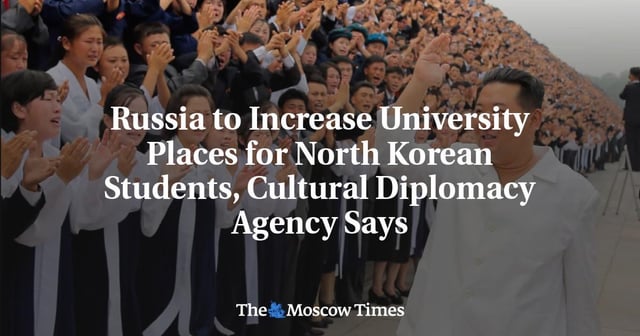By Kristina Vankova
In a move poised to strengthen educational and diplomatic ties, Russia has announced plans to significantly increase the number of university places available to North Korean students. The initiative is a part of Moscow鈥檚 ongoing efforts to bolster its relationship with Pyongyang through enhanced educational exchange and collaboration. This development comes amid broader geopolitical dynamics in the region, underscoring the strategic importance both nations place on this growing partnership.
Boosting Educational Collaboration
The decision to expand university placements for North Korean students underscores Russia鈥檚 commitment to fostering stronger educational ties with its Asian neighbor. Russian universities are expected to welcome a larger cohort of North Korean students, providing them with access to a diverse array of academic programs, ranging from engineering and sciences to the humanities. This not only facilitates academic growth but also enhances cultural exchange and mutual understanding between the two countries.
The cooperation reflects a strategic alignment, especially given North Korea鈥檚 limited avenues for international academic engagement due to ongoing sanctions and geopolitical isolation. For North Korean students, the opportunity to study in Russia represents a rare chance to gain exposure to global educational standards and practices.
Diplomatic Implications
Beyond the educational advantages, the expansion of university placements has significant diplomatic implications. Russia and North Korea have been seeking to enhance their bilateral relations, with education serving as a non-controversial and mutually beneficial platform for engagement. By accepting more North Korean students, Russia is paving the way for deeper diplomatic conversations and potentially increased influence within the Korean peninsula.
This move is also indicative of Russia鈥檚 broader strategy to assert its presence in the Asia-Pacific region. It demonstrates Moscow鈥檚 intent to cultivate goodwill and strategic alliances beyond its immediate borders, utilizing education as a tool for soft power. The initiative could also help counterbalance Western influence in global geopolitics by fortifying Russia鈥檚 partnerships in regions where Western countries have traditionally dominated.
Economic and Cultural Benefits
Hosting more North Korean students in Russian universities is expected to yield economic and cultural benefits for both countries. On an economic level, the influx of international students can contribute to local economies, particularly in cities where these universities are based. The provision of tuition, lodging, and other expenses injects capital into local markets, thereby fostering economic growth.
Culturally, the exchange allows for a richer, more diverse university environment. Russian students gain firsthand insight into North Korean culture and perspectives, promoting a more globally inclusive mindset. Similarly, North Korean students are offered an opportunity to experience life in Russia, broadening their worldview and potentially impacting their home country鈥檚 outlook upon their return.
Furthermore, these educational exchanges can lead to long-term partnerships and innovations as graduates may go on to collaborate on international projects or ventures. Such partnerships can offer scalable benefits that go beyond immediate educational gains, fostering a network of professionals who can bridge gaps between their respective countries.
The decision to increase placements for North Korean students is emblematic of a growing trend where educational platforms are leveraged for broader geopolitical strategies. As Russia and North Korea continue to deepen their ties through such initiatives, the long-term implications for regional stability and cooperation remain a focal point of international discussion.
